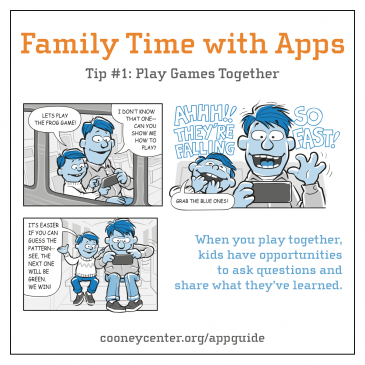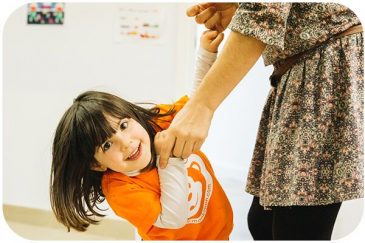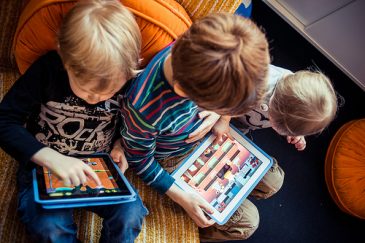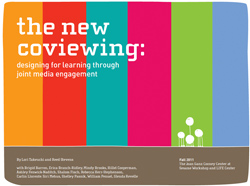We Stink at Playing with Our Kids: Thinking Differently About Playing Together
July 7, 2014
Last week I almost wrecked the imaginary birthday party my daughter was throwing for Strawberry Shortcake. I was sitting on the floor in her room next to Plum Puddin’, Lemon Meringue, Orange Blossom and a few other three-inch-tall plastic guests, when she looked up and casually asked: “What’s more, daddy, four and a half or five years?” I jumped up, got the wooden blocks out and started piling them up in five columns. I was hoping that the concreteness of the blocks would help answer a question on the much more abstract concept of time. After a while, though, I saw that my daughter’s curiosity just wasn’t there anymore. I stopped mid lesson. I realized I was inadvertently teaching her something else—that the importance of learning math is something that can wreck a birthday party if you let it. It took us awhile, but we eventually got back to the other guests and got that party started.
Co-play is tricky business. A couple of years ago Emil Ovemar, Executive Producer and Co-founder of Toca Boca, the company that I work for, asked me to come up with a digital toy concept that would encourage children and parents to play together. The next day, I suggested an app based around the idea of a bike shop. The children would assemble the bikes and the adults would manage the business of the shop, pricing the bikes and selling them to virtual customers. Imagine: a giraffe comes in and needs a tall race bike. The parent says: “Hey kid! Do we have that? No? Can you build it? I’ll tell the giraffe to wait.” Next, a hippo comes in and needs a sturdy beach bike… I thought it was a good concept— the kids get to be creative and the adults handle the books. The app didn’t get made, though, and we never came up with another concept for co-play. Eventually, we abandoned the idea of designing specifically for child-parent play altogether, and I’m happy about that. Here’s why: many parents, myself included, stink at playing with their children.
Why? Let me give you three reasons.
1. Boss-employee relationship.
Whether you want to be or not, for most of the day, just like in the virtual bike shop, you are your child’s manager.
“Good morning, Sweetie! Time to get up :-)”
“Get dressed, now”
“Eat your breakfast”
“No, this is not a good time to play with your doll…”
“Put your seat belt on, okay?”
While an increasing number of companies are moving towards a more modern professional management philosophy with self-direction (where employees are trusted to manage and execute their own responsibilities with minimal intervention), parenting has gone in the opposite direction, towards less trust. There are more things every child must learn at an even earlier age—more homework, more adult-led activities, less unsupervised play, and less free time for children’s own self-determined activities.
 Now think about it: After a long day of completing the tasks mandated to you by your manager, do you long to go out and have a beer with him or her? Or would you rather go and do your own thing? I bet, on most days, it’s the latter.
Now think about it: After a long day of completing the tasks mandated to you by your manager, do you long to go out and have a beer with him or her? Or would you rather go and do your own thing? I bet, on most days, it’s the latter.
Hopefully, your children’s love for you tops the love you have for your boss, but you can’t deny that the relationship has similarities. You are their manager for most of the day so when your child is about to get some imaginative play going, don’t be surprised if you’re not invited to direct it.
2. Parents try to educate through play.
Childhood has increasingly gone from a time of exploration and socialization to one of resumé-building. As a result, parents increasingly fear for their child being left behind academically. Between officially scheduled educational activities, parents look for “teachable moments” while interacting with their children. But the foundation for play is free improvisation, and nothing wrecks play like a hidden agenda from one of the participants. As you now know, in our house, Strawberry Shortcake almost missed her four-and-a-half year old birthday because some idiot tried to change the script to be about math.
3. Adults lack imagination.
Children are highly creative until they enter an environment where they engage in adult-led activities all day – school. As an adult, you have been in school too long. You are now educated and thus confident that you know how the world works. As a result, you don’t have the same need to engage in free form improvisational theater with your peers to explore the gaps that exist between your clusters of knowledge. This means you’re not going to be a great partner in playing with kids. You just aren’t going to have the same stage presence.
Now I’m not suggesting that co-play between parents and their children can never happen. It absolutely can. But play can’t happen on the parents’ terms. We have to recognize that as parents, we are realistic, risk-averse, predictable and goal-oriented control freaks. You can’t expect the unexpected from us, but take away the unexpected from play and you have little left.
Instead, wait until your child invites you and allow play to happen on their terms. When you join them, leave your adult agendas behind, and work hard at sustaining your disbelief during play time.
Fred Rogers once said “Play is really the work of childhood.” Once you accept that you are just a visitor at your children’s job, you can just sit back and watch the pros.
Strawberry Shortcake’s birthday party ended with all of the guests going on an airplane to Texas. Guess who was the airplane? Me. As a guest in my daughter’s play world, I’m happy with any supporting role she offers, even if it’s just being a prop.

Jens Peter de Pedro is a Play Designer at Toca Boca, the leading children’s digital toy app developer. Mr. de Pedro is the Play Designer behind apps such as Toca Hair Salon, Toca Band, Toca Kitchen, Toca Train and Helicopter Taxi. He has worked for organizations such as The United Nations, WGBH Boston, and Swedish Television.
Mr. de Pedro has a master’s degree from New York University in Interactive Telecommunications and a bachelor’s degree from Stockholm University in Psychology, Education and Children’s Culture.
Mr. de Pedro likes cheap food, playing basketball and going for walks in desolate industrial areas. He also enjoys rhyming to a beat under the pseudonym Dude’s a Rapper. He lives in Brooklyn with his wife and two daughters.
His name is pronounced Yens.






